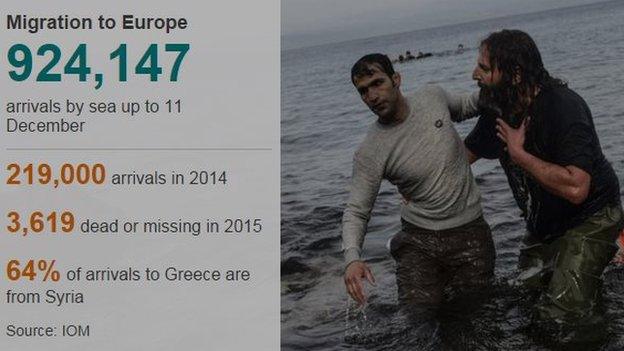Migrant crisis dominates as EU holds final summit of 2015
- Published
Katya Adler reports on the challenges facing the EU
EU leaders are gathering in Brussels for an end-of-year summit focused on tackling Europe's migrant crisis.
German Chancellor Angela Merkel and leaders from seven other EU nations held a special meeting with Turkish Prime Minister Ahmet Davutoglu earlier.
One proposal being considered is for the EU to resettle Syrian refugees directly from camps in Turkey - but some countries oppose this.
Other topics include plans for an EU border force and the UK reform agenda.
More than 900,000 people have arrived in Europe this year, prompting some states to build fences and introduce border controls in defiance of the EU's border-free Schengen area.
The Paris attacks in November have also heightened security concerns across the bloc.
More palatable
Arriving for the summit, Mrs Merkel and French President Francois Hollande both said they supported the European Commission's proposal for a beefed up border force.
"We must equally respect the promises which we have already made - notably regarding refugees who need to be resettled," Mr Hollande added.
The BBC's Damian Grammaticas on board a rescue boat in the freezing Aegean Sea
The latest resettlement plan, external would see EU countries accept Syrian refugees directly from Turkey under a voluntary scheme.
It is hoped the plan will stop people making the dangerous sea journey to Greece and will be more palatable for EU members than obligatory quotas.

Slow progress on plans to solve crisis
Relocation of 160,000 refugees from Italy and Greece Progress: Only 184 relocated to other EU countries
Resettling 22,000 refugees "in clear need of international protection" from camps in Middle East Progress: about 600 refugees resettled to EU
Eleven "hotspot" migrant reception centres in Italy and Greece Progress: Two operating so far
Common EU list of "safe" countries where migrants can be sent back to Progress: Not yet agreed
Reduce number of migrants arriving in EU by boat Progress: About 4,000 migrants still arriving daily in Greece by sea from Turkey - not much fewer than November average
EU experts and equipment deployed in Greece and Bulgaria to help border staff Progress: Frontex agency still short of resources
Source: Luxembourg EU presidency

A report to be delivered to the summit says a €3bn (£2.1bn) deal with Turkey has had little success reducing the flow of refugees and migrants to Greece.
But Mrs Merkel described Thursday's special meeting between Turkey and eight EU nations - including Belgium, Austria and Greece - as "very good".
She said interested member states could choose to join similar talks in the future, looking at how to reduce illegal migration and improve systems for legal migration.
'Not to scare off'
The fight against terrorism is also expected to dominate after it emerged that at least two of the Paris attackers used the migrant route to travel to France.
But writing in his summit invitation, external, European Council President Donald Tusk was keen to keep migration and terror as separate issues.
"The protection of our external borders is not intended to scare off those who flee wars or persecution," he said.
Many migrants are fleeing violence in Syria, Iraq and Afghanistan.

As a tumultuous year draws to a close, European leaders are struggling to maintain unity, reports the BBC's Chris Morris in Brussels.
The UN's refugee agency says, external 954,481 migrants and refugees have landed on Europe's shores this year, and more than 800,000 of them have arrived in Greece. Most travel north via the Western Balkans to countries such as Germany and Sweden.
Speaking to German daily Die Welt, external, Austrian Chancellor Werner Faymann warned that eastern European countries could lose some EU budget funds if they refused to share the burden of accommodating migrants.
"Solidarity isn't a one-way street," he said.

At a glance: The summit agenda
Migration - How have the decisions taken in response to the migrant crisis been implemented?
Terrorism - Border controls, radicalisation, exchange of information and counter-terror co-operation after the Paris attacks
UK referendum - British Prime Minister David Cameron has proposed a number of reforms as the UK gears up for an in/out vote on EU membership
Single market - Measures designed to boost the continent's single market
Economic and monetary union - In a year that could have seen Greece ejected from the euro, leaders will discuss proposals from EU chiefs

The summit will also discuss British efforts to renegotiate its membership of the EU before holding a referendum, by the end of 2017, on whether to stay or leave.
Leaders discuss Cameron's reforms
Chancellor Merkel has stressed the "enormous importance" of avoiding a British exit but said she was not prepared to give in to all of Prime Minister David Cameron's demands for reform.
Poland, Hungary, Slovakia and the Czech Republic said on Thursday they would reject any British demand to change EU laws that would lead to discrimination of their citizens or limit their freedom of movement.
Meanwhile Jean-Claude Juncker, the head of the European Commission, said before the summit: "We want a fair deal with Britain and this fair deal has to be a fair deal with other countries," adding that he did not want the UK to leave.